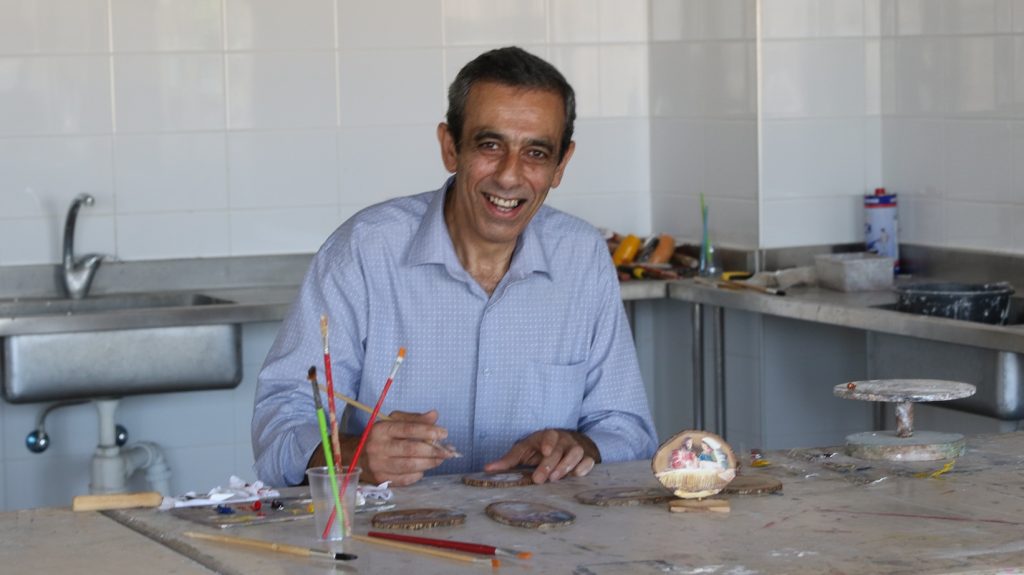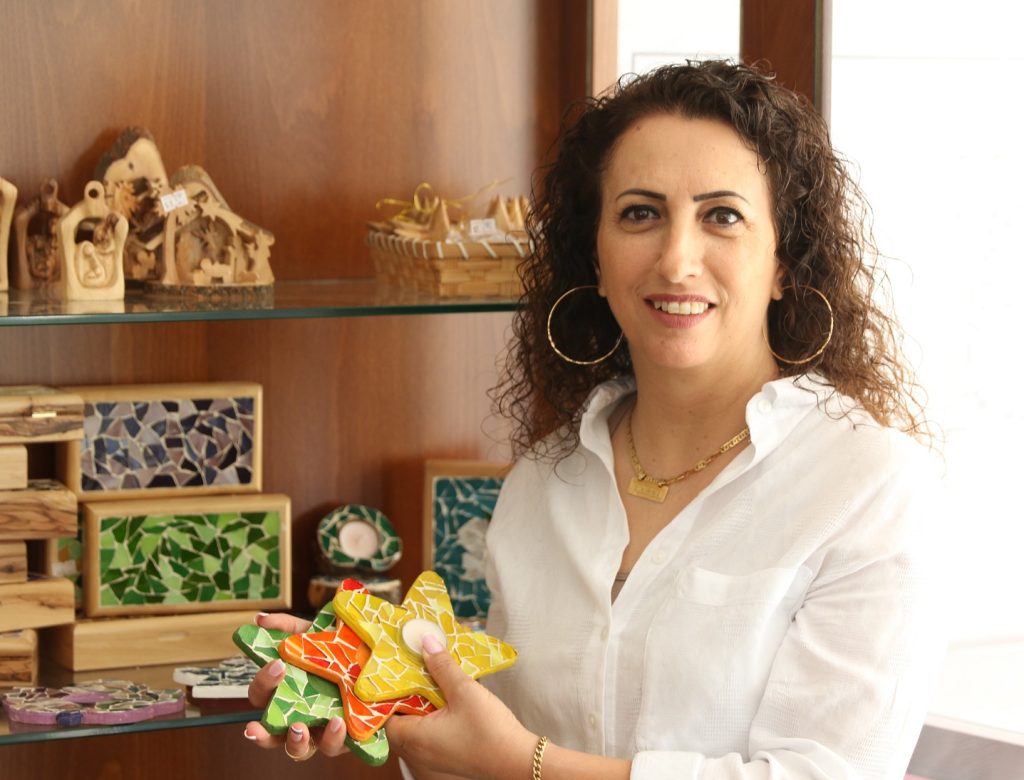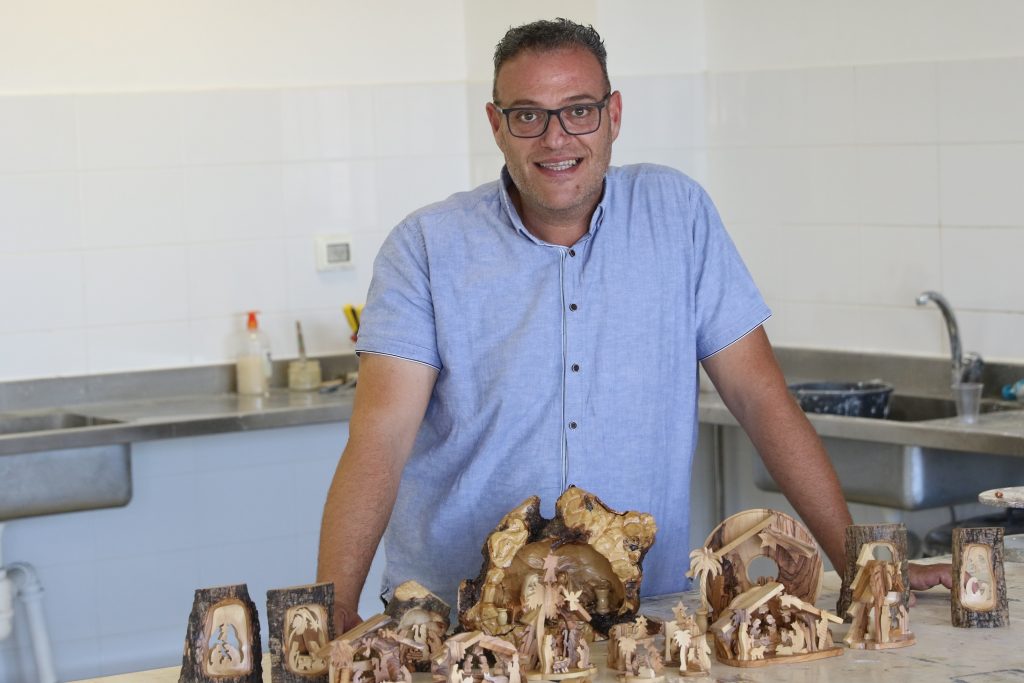Zaki Baboun (زكي بابون)

Zaki Baboun
Zaki Baboun is a full-time visual artist based in Beit Jala who specializes in painting on olive wood. He began his artistic career about 30 years ago in crafting olive wood souvenirs, a traditional Palestinian handicraft that has been very popular in the Bethlehem area for decades.
For years, Zaki developed himself as a painter who combines fine art with olive wood. He created his unique line, which specializes in drawing Christian religious images on pieces of olive wood. He is considered a self-taught and self-trained artist who equipped himself with knowledge and experience through researching and experimenting, away from formal education. Zaki did not finish high school and dropped out of secondary school. However, he took some art courses in the basics of fine arts and painting, and his talent and passion were capable of making him an independent creative artist.
Zaki set up a small home studio where he practices his art and paints on canvas and pieces of olive wood. Biblical stories and characters inspire his paintings. He stated that historical sites like churches and mosques are an essential source of inspiration for his work as a visual artist who markets his products to foreign tourists and pilgrims visiting Bethlehem and the Holy Land.
As a Palestinian artist living under Occupation, Zaki carries the responsibility towards his homeland. Through his works, he tries to convey messages about the history of the Holy Land.
Zaki collaborates with Dar al-Kalima in several ways, like marketing his products in the art gallery and participating in group exhibitions. He has also tried to sell his products through touristic souvenir shops in the Bethlehem area. However, these stores have been completely closed due to the coronavirus pandemic since March 2020. Zaki currently suffers from low sales rate because the tourism sector has been inactive since then and is trying to adapt to the new reality by creating customized products according to the local customer’s demand.
Zaki faces some technical difficulties related to obtaining materials and equipment for his work. He said most of the materials available in the local market do not meet his needs as a professional visual artist, such as canvas, oil and watercolours, and paintbrushes. Therefore, he is always looking for ways to get the required materials from abroad.
Zaki looks forward to organizing his first individual art exhibition in the future.
زكي بابون
زكي بابون من سكان مدينة بيت جالا، فنان تشكيلي متفرّغ مختص في الرّسم على خشب الزيتون، بدأ مسيرته الفنية منذ حوالي ثلاثين عاماً في أشغال التّحف الشّرقية المصنّعة من خشب الزيتون وهي حرفة تقليدية تشتهر بها محافظة بيت لحم.
منذ سنوات، قام زكي بتطوير نفسه كفنان تشكيلي يقوم بالدّمج بين الفن التشكيلي وخشب الزيتون واتّبع أسلوب رسم الرّموز الدّينية المسيحية على قطع خشب الزيتون. عمل على تطوير قدراته بشكل شخصي من خلال البحث الذاتي والاطّلاع على تجارب فنانين آخرين بعيداً عن دراسة الفن بشكل أكاديمي. لم ينه زكي تعليمه الأكاديمي فقد انسحب من المدرسة قبل الثانوية العامة ولكنه التحق بدوراتٍ فنية متخصصة في أساسيات الرّسم والتشريح وكانت موهبته الفطرية كفيلة بتطويره كفنان مستقل ومجتهد.
أسّس مرسمه الخاص في غرفة في منزله حيث يقوم برسم اللّوحات التّشكيلة على أقمشة الكانفاس وقطع خشب الزيتون. يعتمد في لوحاته على قصص الكتاب المقدس كما تشكّل المواقع التّاريخية والمقدّسات المسيحية والإسلامية في فلسطين التاريخية مصدر الهام أساسي لعمله كفنان تشكيلي يسوّق لمنتجاته للسيّاح الأجانب والحجاج الذين يزورون مدينة بيت لحم والأراضي المقدسة. يشعر زكي كفنان فلسطيني بالمسؤولية تجاه وطنه الذي يقبع تحت الاحتلال ويحاول من خلال أعماله إيصال رسائل وطنية ودينية للتّعريف بتاريخ الأراضي المقدسة، رسالة سلام من فلسطين الى العالم أجمع.
يتعاون زكي مع دار الكلمة بعدّة طرق من خلال تسويق منتجاته في جاليري دار الندوة والمشاركة في المعارض الجماعية التي تنظّمها دار الكلمة. وكان يقوم بتسويق منتجاته من خلال التّعاون مع بعض محلات التّحف الشّرقية السّياحية التي أغلقت تماماً بفعل جائحة كورونا منذ آذار 2020. في الوقت الحالي، يعاني زكي من ضعف في نسبة المبيعات ويحاول اختراق السوق المحلي من خلال تنفيذ قطع حسب رغبة وطلب الزبائن المحليين.
يؤكد زكي أن أسلوبه يتطلّب الكثير من الوقت لإنتاج قطعة واحدة مما يجعله مضطراً لتقليل عدد المنتجات ورفع سعر القطعة الواحدة. في المقابل، يجتهد زكي لتطوير نفسه وزيادة كفاءته ليتمكن من تحقيق إنتاج أكبر ويحافظ على سعر مقبول للزبائن المحتملين.
يواجه زكي صعوبة كبيرة في الحصول على المعدّات والمواد الأساسية لممارسة عمله ويؤكد أن معظم المواد الموجودة في السّوق المحلي لا تلبّي احتياجاته كفنان محترف من أقمشة الكانفاس والألوان الزيتية والمائية وريش الرّسم، مما يضطره في معظم الوقت لطلبها من بعض الأصدقاء عندما يسافرون الى دول أوروبية حيث تتوفر هذه الأدوات.
من وجهة نظره، على الفنان التأقلم مع متغيرات الواقع ومعطيات الحياة ويؤكد انه استمر في العمل في مشغله المنزلي أثناء جائحة كورونا وفترات الحجر الصحي. بالإضافة الى ذلك، يرى من تحديات الواقع فرصاً لاستلهام أفكاراً جديدة تولد من الألم والمعاناة.
يطمح زكي في المستقبل القريب إلى تنظيم معرضه الفني الفردي ويتطلع الى زوال أزمة الكورونا وعودة الحياة إلى مجاريها ليتمكن من تخصيص الوقت والجهد اللازم لتحضير حوالي عشرين لوحة لمعرضه الخاص.


